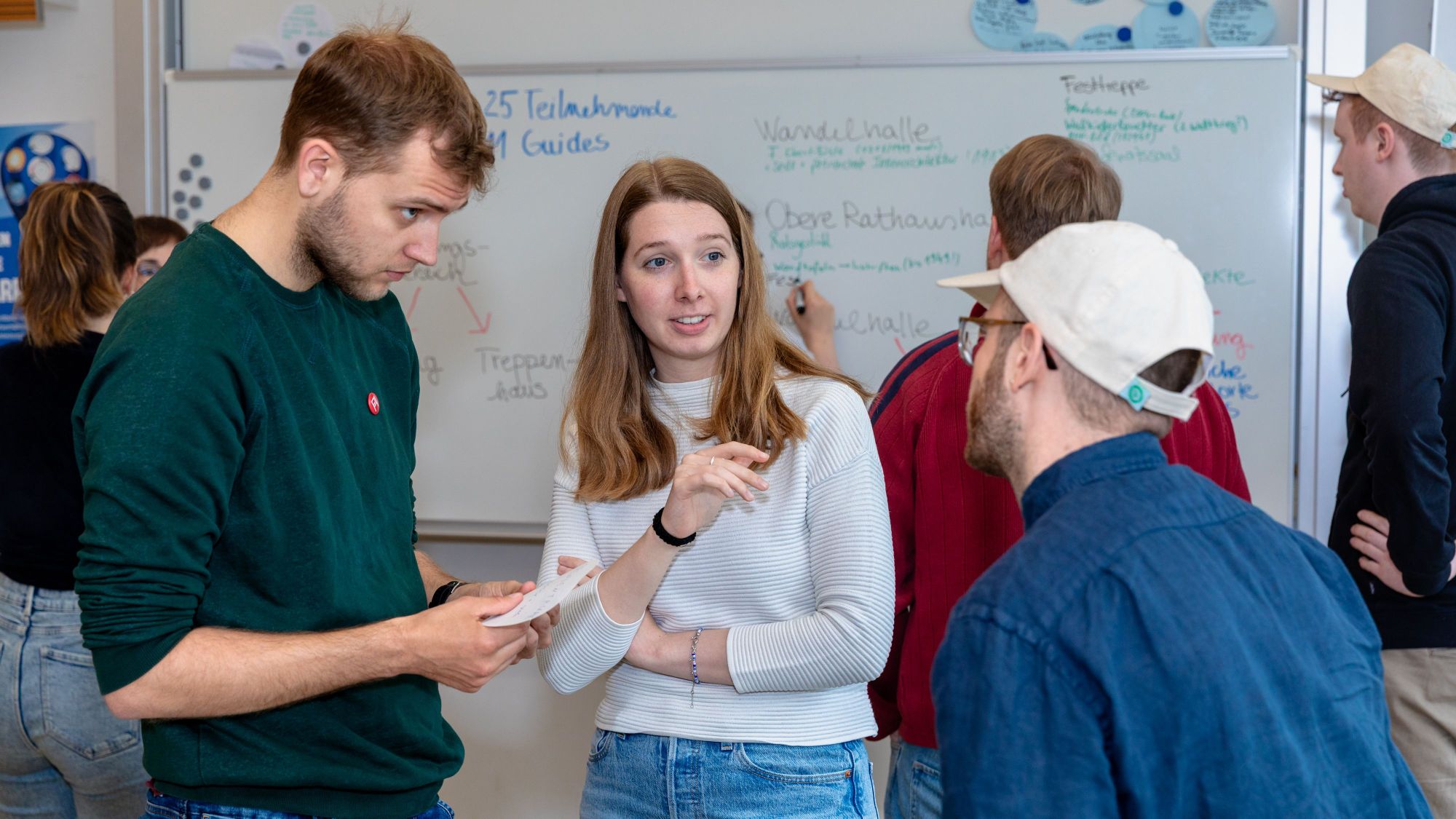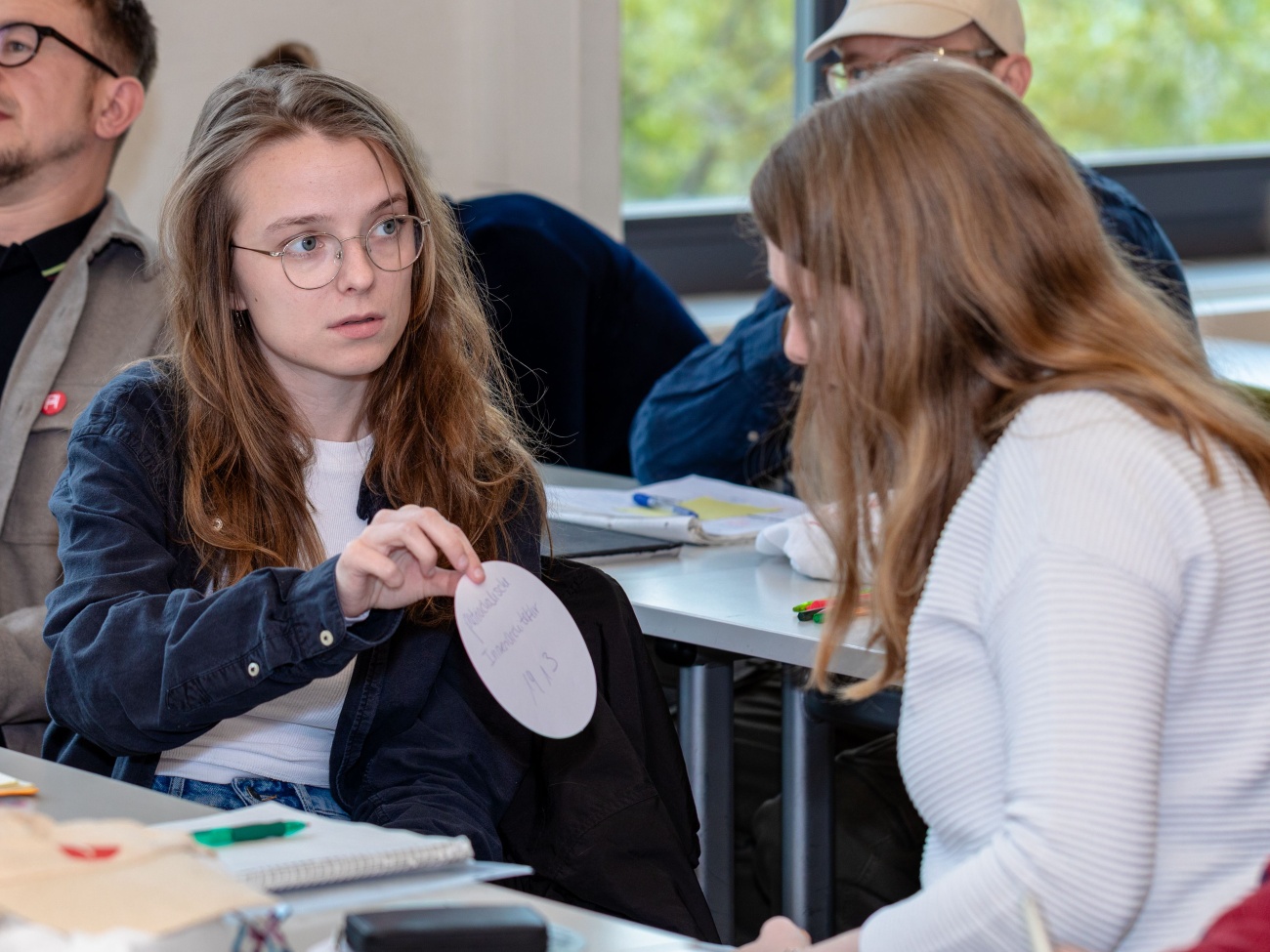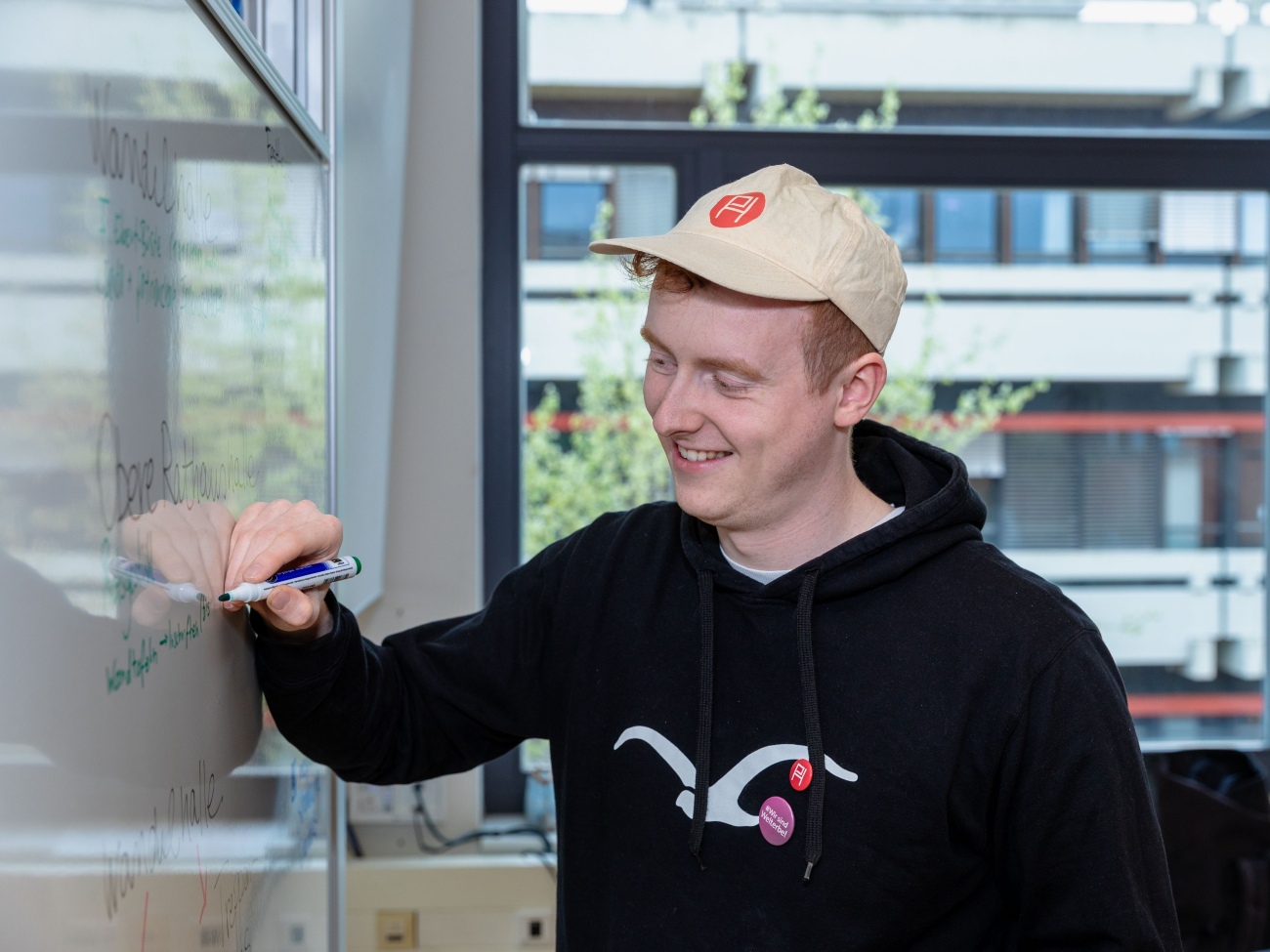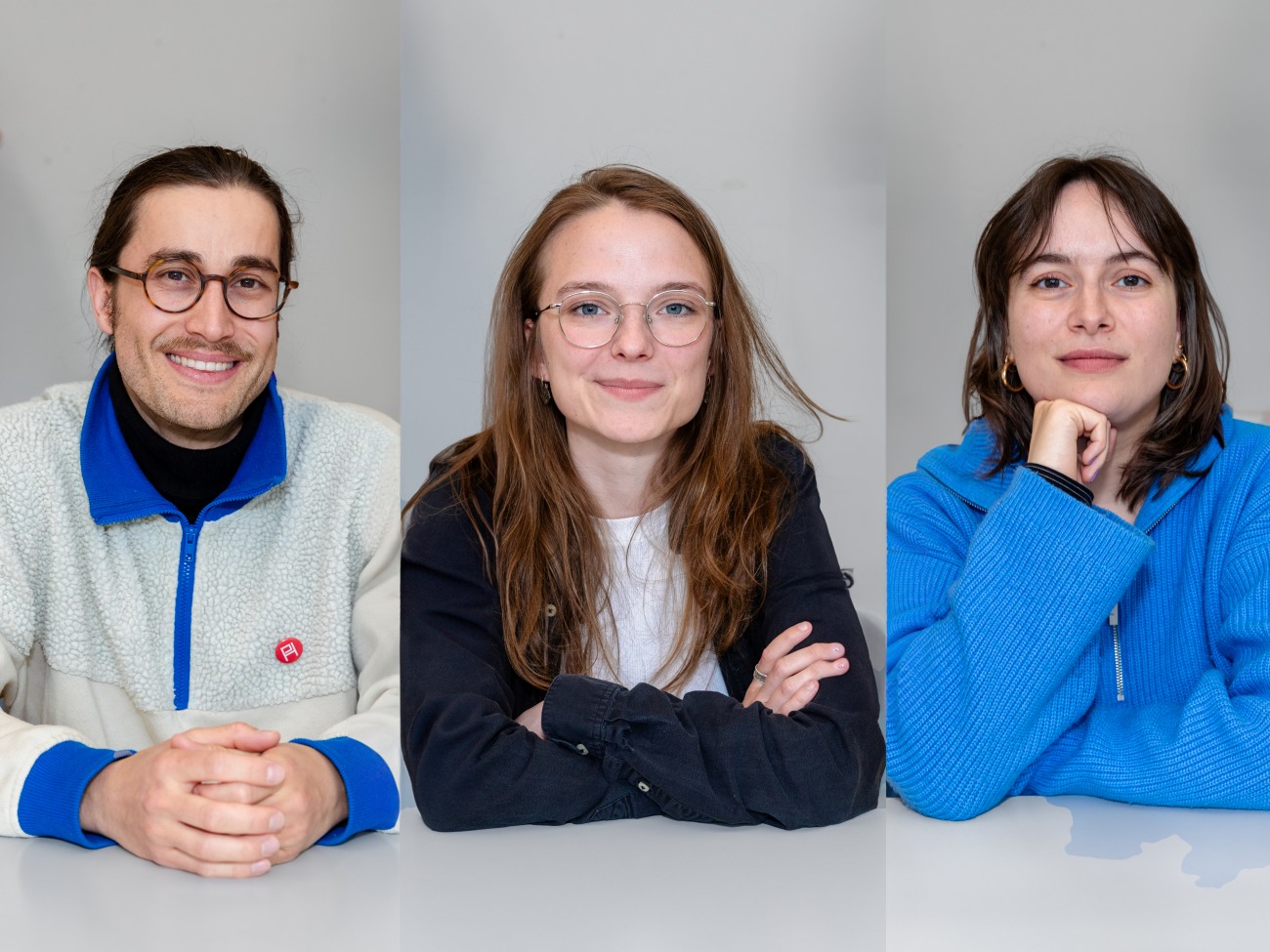
© Matej Meza / Universität Bremen
Public History – The Cherry on Top of Your History Degree
In the Public History master’s program, students learn how our approach to the past shapes the present
Historical expertise plus communication skills – this is the mix at the heart of the Public History master’s program offered by the History Department. The relatively new program, with its strong practical focus, will begin its second round in the winter semester. Prospective students can learn more about the degree program at information events in May and June. University lecturer Dr. Thekla Keuck and second-semester students invited the up2date editorial team to their seminar to provide us with a glimpse into the program.
Upon entering the seminar room, it is immediately obvious that things are a little different here from most courses. Twelve master’s degree students are standing in small groups around the room, engaged in lively discussion. Ideas are generated at a rapid pace, critically examined, refined, and, in some cases, rejected again. Almost everyone has colored flashcards with keywords in their hands.

© Matej Meza / Universität Bremen
Some of these flashcards are already stuck to the large board, some are connected through different colored arrows with keywords between them such as “Friedrich-Ebert-Büste” (a bust of Friedrich Ebert), “Wandelhalle” (a hall in the Bremen Town Hall), and “Räterepublik” (Council Republic). In a visibly creative way, the students are creating a unique, one-hour walking tour of Bremen Town Hall for the Bremen World Heritage Days (Bremer Welterbetage) from May 28 to June 1 (in German).
A Fresh Narrative for the Town Hall Tour
“During the tour, visitors can get to know the town hall in a whole new way through unusual objects and their history,” explains student Lena Geisel. It is important to give the objects context. “That includes, for example, asking what is interesting about this object from today’s perspective,” the 24-year-old continues.
Her fellow student Sophia Zimmermann elaborates: “I’m going to present a lamp that was made from a whale jawbone. We can use this to talk about whaling in Bremen in the 18th century. Or we can highlight how the object has changed over the centuries. That’s what we are doing in the seminar right now. We’re piecing together the individual stops of the tour so that they add up to a coherent picture for the visitors.”

© Matej Meza / Universität Bremen
“Although the tour is intended to break new ground, the most important dates and defining eras must still be included,” adds student Jared Schauer. After all, participants expect a comprehensive introduction to Bremen’s world heritage. We are also targeting people who don’t know the town hall at all,” says the 30-year-old. And, very importantly, the tour must not last longer than an hour, because experience has shown that people tend to lose focus after that.
Focused Atmosphere in the Seminar Room
It is not easy to meet all these requirements. University lecturer Dr. Thekla Keuck keeps an eye on the big picture. She not only supports students on their way to becoming successful Bremen Town Hall guides, but is also the driving force behind the newly designed program: “Public history, namely the practice and methods of conveying history, originated in the US and has only been established in Germany for the last 15 years. A few years ago, the History Department decided to strengthen this particular field.”
100% Master’s Degree in History
“For me, Public History is the cherry on top of my history degree. It is 100 percent a master’s degree in history and so much more at the same time. In the first semester, we focus on theories, methods, and terminology of history as well as working with historical sources,” she emphasizes. This is important because this solid subject-specific foundation is the prerequisite for conveying historical knowledge to the public.

© Matej Meza / Universität Bremen
Students then apply these skills to practical projects starting in the second semester – such as the Bremen Town Hall tour. “Our goal is to teach graduates to use their historical expertise to develop new narratives for the public once they have questioned the old ones,” the program director adds.
Counteracting Populism
For Lena Geisel, the current political and social situation is another reason to pursue a master’s degree in Public History. “Currently, we can see in the US how public discourse uses historical narratives to legitimize its arguments,” she states. This increasing populism concerns her: “I want to actively work against such tendencies. The degree program not only teaches us subject knowledge and communication skills, but also gives us an understanding of how historical narratives are used in public discourse. For me, that is fundamentally important.”
And After Graduation?
Possible career fields include museums, memorial sites, documentation centers, cultural management, journalism, and tourism. Lena Geisel and Jared Schauer are already fairly certain that they want to work in a museum after graduating. Sophia Zimmermann is still undecided. “I’m going to do an internship at the KZ-Gedenkstätte Dachau (Dachau Concentration Camp Memorial Site) during summer and then take it from there,” she says.
Further Information
Bremen World Heritage Days (Bremer Welterbetage)
The upcoming 2025 Bremen World Heritage Days will take place from May 28 to June 1. The Bremen Town Hall tour designed by the students will take place on May 31. Participation is free of charge. The World Heritage Days program also includes a panel discussion with some of the students. For more information about the program and registration, visit the website of the Bremen Senate Chancellery. (In German)
Public History Master’s Program
The Public History master’s degree program is focused on real-world applications, is interdisciplinary, and covers multiple historical periods. It builds on a bachelor’s degree in history or a comparable discipline from the social sciences or cultural studies. Courses in the degree program are held in German. For prospective students, there will be information sessions on Monday, May 26, at 12 p.m. in person (GW2 Building, Room B2335a) and on June 17 at 10 a.m. via Zoom. The event will be in German.
Public History Website (in German only)